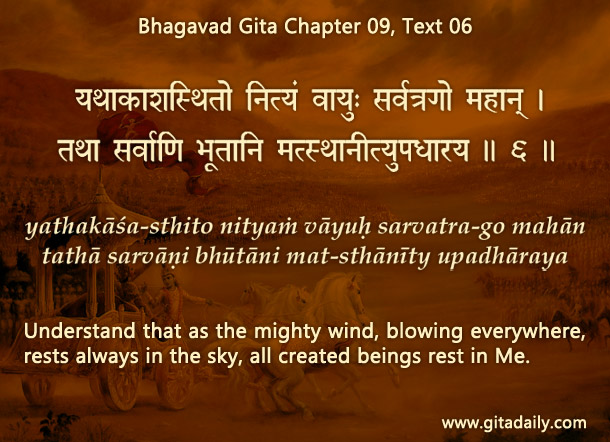God determines the scope of our actions not our actions themselves
Some people ask, “If God is the supreme controller, does his controllership mean that whatever we do, he is controlling us and compelling us to do that?”
No. God is the supreme controller, but not the sole controller. By his sweet will, he has given all of us free will. And based on our individual past karma, he gives each one of us a certain area of control (known in Sanskrit as kshetra). What we do within that allotted area is up to us. Of course, whatever we do has to be sanctioned by him, but it’s not impelled by him. For example, when someone becomes violently abusive, God doesn’t want them to act that way – they want to, and God allows them, within their area of control. And for their grievous misuse of free will, they will duly get proportionate karmic consequences.
To illustrate how our will rests within God’s will, the Bhagavad-gita (09.06) gives the example of wind moving within the sky. If we envision the sky as an upside-down bowl, then the sky determines and delimits the area of the movement of the air, not the direction of its movement – within the sky, the air can move up or down, left or right. Krishna’s will is like the sky, our will like the wind. He limits the scope of our actions, but within that scope, we control what we do.
Claiming that Krishna is doing what we are doing leads to several problematic questions. Why should we be held morally or legally accountable for our actions? Why should we learn ethics? Indeed, why should Krishna speak the Gita at all?
By understanding that we are responsible for our actions, we can become determined to seek guidance from Krishna through the Gita and thereby make healthy choices.
Think it over:
- When people do evil things, what is their role and what is God’s role?
- What metaphor does the Gita use to illustrate the relative jurisdictions of divine will and human will?
- What problematic questions arise from the claim that Krishna is doing what we do?
To know more about this verse, please click on the image
Explanation of article:
https://www.youtube.com/watch?v=FUCYAeE8-b0&feature=youtu.be
Podcast:


Now Q’s asked at the end of the articles for us to think it over is very nice. The dumb intelligence is getting churned. After reading, now we are contemplating also through these Qs. Very nice. Thank you.
Thank you – happy to be of service.